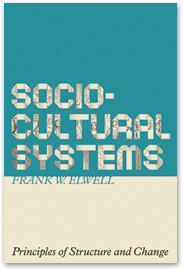
Sociocultural Systems: Principles of Structure and Change Macrosociology: Four Modern Theorists A Commentary on Malthus" 1798 Essay as Social Theory Great Classical Social Theorists In the Classical Tradition: Modern Social Theorists Dr. Elwell's Professional Page
|
Herbert Spencer's Evolutionary Sociology Karl Marx | |
|
Karl Marx: On Capitalism
By Frank W. Elwell
The forces of production are, strictly speaking, the technology and work
patterns that men and women use to exploit their environment to meet their
needs. These forces of production are expressed in relationships between
men, which are independent of any particular individual and not subject to
individual will and purposes. While industrialism would be a particular
“force of production,” capitalism would be a particular “relation of
production.” By relations of production, Marx means the social relationships
people enter into by participation in economic life. The relations of
production are the relations men (and women) establish with each other when
they utilize existing raw materials and technologies in the pursuit of their
production goals.
While Marx begins with the f
According to Marx, men and women are born into societies in which property
relations have already been determined. These property relations, in turn,
give rise to different social classes. Just as a man cannot choose who is to
be his father, so he has not choice as to his class. [Social mobility,
though recognized by Marx, plays no role in his analysis.] Once a man is
ascribed to a specific class by virtue of his birth, once he has become a
feudal lord or a serf, an industrial worker or a capitalist, his behavior is
proscribed for him. His attitudes, beliefs, and behaviors are all
“determined.” The class role largely defines the man. In the preface to
Capital Marx writes: “Here individuals are dealt with only as fact as
they are personifications of economic categories, embodiments of particular
class-relations and class interests.” Different locations in the class
structure lead to different class interests. Such differing interests flow
from objective positions in relation to the forces of production. In saying
this Marx does not deny the operation of other variables in human behavior;
but he concentrates on class roles as primary determinants of that behavior.
These class roles influence men whether they are conscious of their class
interests or not. Men may well be unaware of their class interests and yet
be moved by them, as it were, behind their backs.
The division of labor gives rise to different classes, which leads to
differing interests and gives rise to different: political, ethical,
philosophical, religious, and ideological views. These differing views
express existing class relations and tend either to consolidate or undermine
the power and authority of the dominant class. "The ideas of the ruling
class are, in every age, the ruling ideas; the class which is the dominant
material force in society is at the same time its dominant intellectual
force.” For example, the business of America is business. We think naturally
in
"The class which has the means of material production at its disposal has
control at the same time over the means of mental production.” This is done
through control over the media, educational curricula, grants and such. This
is not the result of a conspiracy; rather it is the dominant viewpoint that
pervades the culture. Because the dominant class owns and controls the
forces of production, the social class in power uses the non-economic
institutions to uphold its authority and position. Marx believed that
religion, the government, educational systems, and even sports are used by
the powerful to maintain the status quo.
Although they are hampered by the ideological dominance of the elite, the
oppressed classes can, under certain conditions, generate counter ideologies
to combat the ruling classes. These conditions are moments when the existing
mode of production is played out; Marx terms these moments “revolutionary.”
The social order is often marked by continuous change in the forces of
production, that is, technology. Marx argued that every economic system
except socialism produces forces that eventually lead to a new economic
form. The process begins with the forces of production. At times, the change
in technology is so great that it is able to harness “new” forces of nature
to satisfy man’s needs. New classes (and interests) based on control of
these new forces of production begin to rise. At a certain point, this new
class comes into conflict with the old ownership class based on the old
forces of production. As a consequence, it sometimes happens that “…the
social relations of production are altered, transformed, with the change and
development…of the forces of production.”
In the feudal system, for example, the market and factory emerged but were
incompatible with the feudal way of life. The market created a professional
merchant class, and the factory created a new proletariat (or class of
workers). Thus, new inventions and the harnessing of new technologies
created tensions within the old institutional arrangements, and new social
classes threatened to displace the old ones based on manorial farming.
Conflict resulted, and eventually revolution that established a new ruling
class based on the new forces of production. A new class structure emerged
and an alteration in the division of wealth and power based on new economic
forms. Feudalism was replaced by capitalism; land ownership as the dominant
form of capital was replaced by factories and the ownership of capital.
Those classes that expe
As this new force of production gained sufficient weight (through
technological development and the resulting accumulation of wealth of the
ownership class), the bourgeoisie “burst asunder the feudal relations of
production” in which this new mode of production first made its appearance.
"The economic structure of capitalist society has grown out of the economic
structure of feudal society. The dissolution of the latter sets free
elements of the former.”
Like feudalism, Marx maintained, capitalism also carries the seeds of its
own destruction. It brings into being a class of workers (the proletariat)
who have a fundamental antagonism to the capitalist class, and who will
eventually band together to overthrow the regime to which they owe their
existence. We will get into the evolution of the revolution in a future
lecture. For a more extensive discussion of Marx's theories refer to Macro Social Theory by Frank W. Elwell. Also see Sociocultural Systems: Principles of Structure and Change to learn how his insights contribute to a more complete understanding of modern societies.
Bibliography:
Elwell, F. (2009), Macrosociology: The Study of Sociocultural Systems.
Lewiston: Edwin Mellen Press. Elwell, F. (2013), Sociocultural Systems: Principles of Structure and Change. Alberta: Athabasca University Press. Engels, F. 1847. The Principles of Communism, (P. Sweezy, Trans.), http://www.marxists.org/archive/marx/works/1847/11/prin-com.htm Engels, F. 1883. “Eulogy for Marx.” Retrieved March 22, 2008, from 1883: The Death of Karl Marx: http://www.marxists.org/archive/marx/works/1883/death/dersoz1.htm Marx, K. 1847/1999. The Poverty of Philosophy. Retrieved March 19, 2008, from Marx/Engels Archives http://www.marxists.org/archive/marx/works/1847/poverty-philosophy/index.htm Marx, K. and Engels, F. 1848. The Communist Manifesto. (F. Engels, Trans. and Ed.) Public Domain Books, Kindle Edition, (2005). Marx, K. 1867/1887. Das Kapital Volume I (Capital). (S. Moore and E. Aveling, Trans.) Public Domain Books, Kindle Edition (2008-11-19). Marx, K. 1894/1991. Capital: Volume III. (D. Fernbach, Trans.) New York: Penguin Books. Marx, K., and Engels, F. 1962. Selected Works, 2 Vols. Moscow: Foreign Language Publishing House. Marx, K. 1964. Selected Writings in Sociology and Social Philosophy. (T. Bottomore, Trans. and Ed.) London: McGraw-Hill.
Marx, K. 1964b. Early Writings. (T. B. Bottomore, Trans. and Ed.) New
York: McGraw-Hill.
Referencing this Site: Karl Marx and the Rise of Capitalism is copyrighted by Athabasca University Press and is for educational use only. Should you wish to quote from this material the format should be as follows: Elwell, Frank, 2013, "Karl Marx and the Rise of Capitalism," Retrieved August
28, 2013 (use actual date),
©2013 Frank Elwell, Send comments to felwell at rsu.edu
|
 orces of production, he quickly moves to the
relations of production that are based on these forces. For Marx, the
relations of production are the key to understanding the whole cultural
superstructure of society. The relations of production (economic
organization) constitute the foundation upon which the whole cultural
superstructure of society comes to be erected. Marx gives the relations of
production the primary focus in his analysis of social evolution. The forces
of production basically set the stage for these relations, and other than
this are given little independent treatment by Marx. Problems of modern
society are therefore all ascribed to capitalism by Marx and his followers,
rather than ascribing some of them to industrialism—a problem we will return
to shortly.
orces of production, he quickly moves to the
relations of production that are based on these forces. For Marx, the
relations of production are the key to understanding the whole cultural
superstructure of society. The relations of production (economic
organization) constitute the foundation upon which the whole cultural
superstructure of society comes to be erected. Marx gives the relations of
production the primary focus in his analysis of social evolution. The forces
of production basically set the stage for these relations, and other than
this are given little independent treatment by Marx. Problems of modern
society are therefore all ascribed to capitalism by Marx and his followers,
rather than ascribing some of them to industrialism—a problem we will return
to shortly.  these categories. The goal of the economic system is to grow; our goal is
to make more money to buy nice things. The point of the educational system
is to provide education and training so that young adults can eventually
assume their role in the workforce.
these categories. The goal of the economic system is to grow; our goal is
to make more money to buy nice things. The point of the educational system
is to provide education and training so that young adults can eventually
assume their role in the workforce.  ct to gain the ascendancy by a change in property
relations become revolutionary. When this is the case, representatives of
the ascending classes come to perceive existing property relations as a
“fetter” upon further development. New social relationships (based upon the
new mode of production) begin to develop within older social structures,
exacerbating tensions within that structure. New forces of production—based
on manufacture and trade—emerged within late European feudal society and
allowed the bourgeoisie, which controlled this new mode of production, to
challenge the hold of the classes that had dominated the feudal order.
ct to gain the ascendancy by a change in property
relations become revolutionary. When this is the case, representatives of
the ascending classes come to perceive existing property relations as a
“fetter” upon further development. New social relationships (based upon the
new mode of production) begin to develop within older social structures,
exacerbating tensions within that structure. New forces of production—based
on manufacture and trade—emerged within late European feudal society and
allowed the bourgeoisie, which controlled this new mode of production, to
challenge the hold of the classes that had dominated the feudal order.